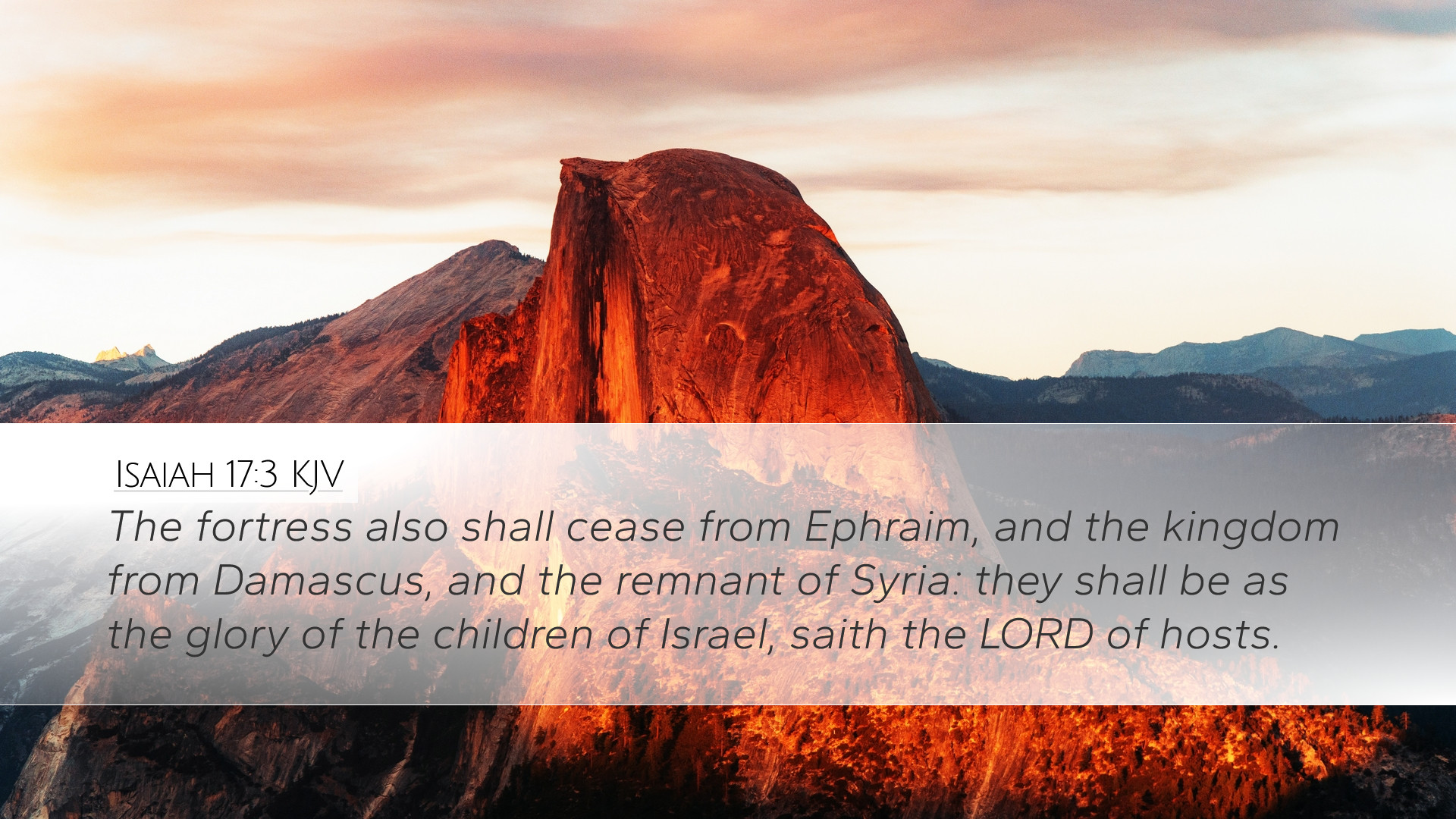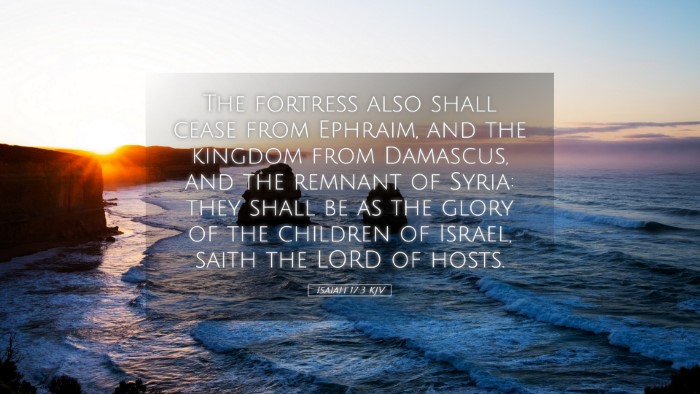Commentary on Isaiah 17:3
Isaiah 17:3 states, "The fortress also will cease from Ephraim, and the kingdom from Damascus, and the remnant of Syria; they shall be as the glory of the children of Israel," (Isaiah 17:3, KJV). This verse is part of a larger prophecy concerning the impending judgment on Damascus and the northern kingdom of Israel (referred to here as Ephraim). Below is a summary derived from notable public domain commentaries.
Contextual Overview
The chapter opens with a proclamation about the destruction of Damascus, the capital of Syria, and extends to the consequences for Israel. Matthew Henry notes the historical setting, highlighting the geopolitical tensions of the time between Israel and her neighbors, especially Syria. Israel, symbolized by its capital, Ephraim, is warned of divine judgment following a period of moral decay and infidelity to God.
Meaning of the Fortress Ceasing
Henry explains that "the fortress will cease" indicates a loss of military power and security for Ephraim. By these words, Isaiah conveys that Israel's reliance on their fortifications will be rendered ineffective in the face of God’s judgment. This concept emphasizes a theological truth that earthly defenses are futile against divine will.
Albert Barnes expands on this by contrasting the strength of Israel's political and military might with their spiritual decline. Barnes notes that though Ephraim had relied upon their fortresses, God would ultimately dismantle these earthly supports, symbolizing a transition from reliance on human strength to returning to divine dependence.
The Kingdom from Damascus
Further, the “kingdom from Damascus” signifies the impending downfall not just of Israel but also Syria. Adam Clarke interprets this to reflect a loss of autonomy for Damascus, indicating that its political relevance will diminish alongside Ephraim's. The mutual destruction symbolizes divine judgment across the nations involved, a theme prevalent in prophetic literature.
The Remnant of Syria as the Glory of Israel
The latter portion of the verse states, "they shall be as the glory of the children of Israel." This statement implies a stark transformation where what once was powerful will now be stripped of glory and significance. Henry points out that the remnants after such destruction often reflect the divine mercy; those who remain may recognize their dependence on God.
Barnes elaborates that glory here is a reference to the favor and blessing that once encompassed Israel, which will now be shifted entirely. The entirety of the passage suggests a cycle of judgment followed by the possibilities of restoration, if that restoration is embraced in humility and contrition.
Theological Implications
This verse carries weighty theological implications regarding divine sovereignty, human pride, and the consequent judgment for unfaithfulness. Clarke suggests that the eventual downfall speaks to God's ultimate control over nations, providentially guiding the course of history.
In a pastoral context, the commentary underscores the necessity of remaining faithful and vigilant. It serves as a reminder to keep humility at the forefront, avoiding the pitfalls of dependency on human strength and the glory of earthly power. The downfall of both Ephraim and Damascus serves as a warning to contemporary believers about the consequences of forgetting reliance on God.
Conclusion
Isaiah 17:3 reflects a moment of profound judgment as well as a call to repentance for both Israel and Syria. The interrelationship between the two nations against the backdrop of divine authority presents a rich tapestry for theological reflection. The insights from Matthew Henry, Albert Barnes, and Adam Clarke together reveal the multifaceted nature of scripture—historical, prophetic, and didactic. The implications of this prophecy transcend time, provoking thoughtful consideration on the role of faith amidst the trials of human existence.
Key Insights
- Judgment on Human Strength: The futility of relying on earthly defenses against God’s judgment.
- Transition in Power: The decline of both Ephraim and Damascus showcases God’s control over nations.
- Call to Humility: A reminder to remain humble and reliant on God's strength rather than human power.
- Restoration Possibilities: There remains hope for a remnant who return to God's favor post-judgment.


